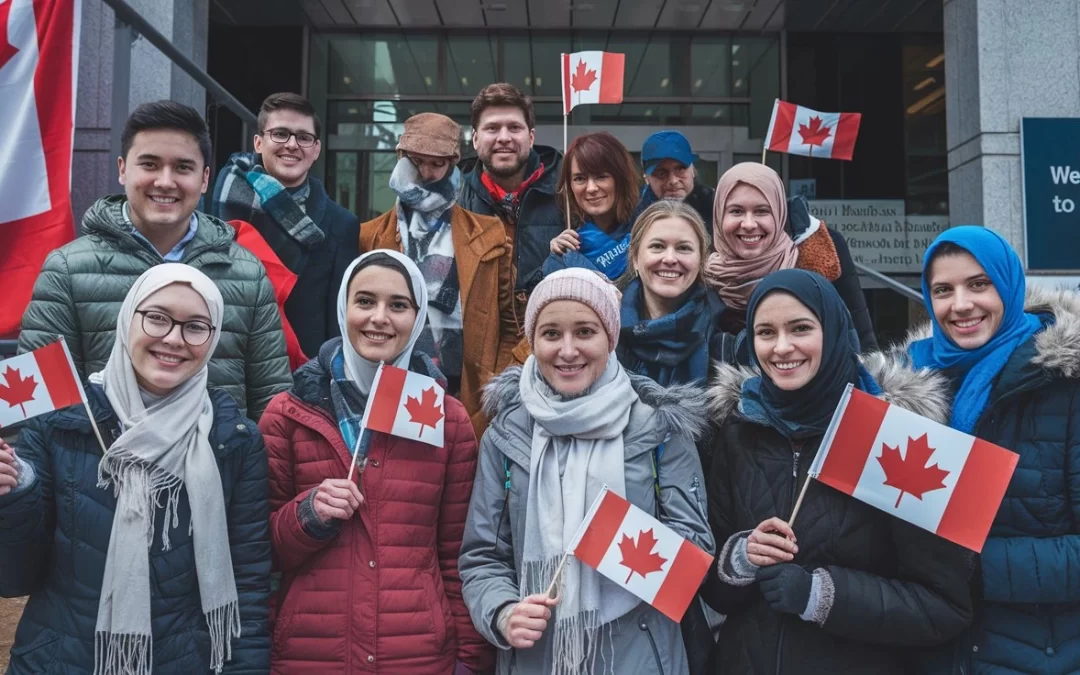The Humanitarian and Compassionate (H&C) application offers a pathway to Canadian PR for individuals who cannot meet standard immigration criteria due to exceptional circumstances. This route is generally pursued as a last resort once other immigration options have been exhausted or when no other viable pathways are available.
The H&C application is primarily designed for those already residing in Canada. It addresses unique and compelling situations, such as long-term establishment, family connections, criminal or medical issues, or de facto family relationships. While it is possible for individuals outside Canada to apply, Immigration, Refugees, and Citizenship Canada (IRCC) rarely consider such applications.
The procedure is distinct and is left up to the judgement of immigration authorities. Applicants must provide substantial evidence and convincing reasons to show why their situation deserves an exception.
Who Can Apply for Humanitarian and Compassionate Grounds?
On the grounds of humanitarianism and compassion (H&C), foreign persons who are residing in Canada but do not currently hold legal immigration status may apply for permanent residence.
- People who have overstayed their visas.
- They were excluded from the family class because their sponsor didn’t declare their existence or have them examined.
- They had a refugee claim denied more than a year ago.
Who is Excluded from the H & C?
- Before submitting an application for H&C, those who have an active refugee claim must withdraw it.
- Ineligible are those who received an adverse decision from Immigration, Refugees and Citizenship Canada (IRCC) in the past 12 months, except those with young children or severe medical conditions.
- Those who in the previous 12 months, retracted their refugee application.
- Designated Foreign Nationals and individuals considered “irregular arrivals” into Canada are excluded for five years.
What conditions must you meet in order to prolong your stay in Canada while filing an H&C claim?
Extending your stay in Canada during a pending Humanitarian and Compassionate (H&C) claim requires careful attention to maintaining your legal status. You must ensure that your work permit, study permit, or visitor visa remains valid while processing your application. This is crucial, as any lapse in your status could lead to a removal order.
Let us see the steps to maintain Legal status during an H&C Application:
- Apply for an extension before your current permit or visa expires.
- Meet the conditions of your current status, ensuring you continue to comply with all regulations (e.g., only work or study with the proper authorization).
- Fulfill the criteria for the category under which you are applying to extend your stay.
- Opt for Online submission for quicker processing, though paper applications are also accepted.
How can you renew an expired Canadian Resident status?
Renewing an expired Canadian resident status requires meeting specific eligibility criteria and taking timely action before your PR card expires. Before leaving Canada as a permanent resident, make sure your card is valid for a minimum of six months. If the expiry date is approaching, apply for a renewal while still in the country.
If you wish to renew your PR status, keep in mind that you must be :
- A permanent resident of Canada.
- Be physically present in Canada.
- Not hold a Canadian citizenship or an Indian Act registration.
- Not be under a removal order.
- Not have been convicted of an offence
If your PR card is lost, stolen, or expires while abroad, request a Permanent Resident Travel Document (PRTD) to return to Canada. You must have this document to re-enter. You can apply for a renewal of your PR card once you’re back in Canada.
What is the process for a H&C application?
Applying for Canadian PR on H&C grounds is a detailed process requiring careful attention. You may begin by:
- Complete all required forms and gather the necessary documents.
- Submission letter that clearly explains your situation and the reasons for your H&C claim.
- Apply and pay the required processing fees.
After submitting your application, Immigration officers will assess your case to determine if your circumstances justify granting you PR. They may consider the certain aspects that help determine whether granting permanent residence on H&C grounds is justified.
Among the variables that could be taken into account include, but are not restricted to:
- Establishment in Canada
- Unable to depart Canada, which resulted in the creation
- Being cut off from family or having connections to Canada
- Best interests of any kids your application may impact
- Health considerations
- Family violence considerations
- Consequences of your separation from relatives
- Elements in your nation of origin (unrelated to applying for protection)
- Anything else you would want to have had taken into account that is pertinent but unrelated to requesting protection.
Consideration of the Child’s Best Interests
When assessing your application, the best interests of any children directly affected by the decision will be carefully considered.
A few examples of variables that could be relevant to the child’s best interests are as follows:
- child’s age
- child’s establishment in Canada
- circumstances in the child’s nation of origin that may have an effect
- child’s medical needs
- child’s education
- child’s gender
Please note that the best interests of a child are one of many significant considerations that the decision-maker will take into account.
You may include critical documents:
- Provide credible third-party documents.
- Include medical reports.
- Submit expert opinions on your home country’s conditions.
- Attach income records.
- Provide recommendations from employers or other relevant individuals.
If your application is accepted, you may apply for permanent residence on H&C grounds. If, for some unfortunate reason, your application is rejected, you may appeal to the Federal Court of Canada within 15 days. But the procedure is intricate and necessitates legal knowledge.
Also remember that online stay extension requests usually process in about three months, while paper applications often take a bit longer. It’s essential to maintain your legal status in Canada and avoid international travel during this time, as you may need to attend interviews or provide additional documentation.
Steps to Apply for H& C Grounds
Applying for Humanitarian and Compassionate (H&C) grounds involves completing several forms and providing detailed information. Here’s how to proceed:
If you are already in Canada
- Fill out the general application: For immigration to Canada, use Form IMM 0008.
- Submit the H&C exemption request: Fill out Form IMM 5283 to request an exemption based on Humanitarian and Compassionate grounds.
If you are applying from outside Canada
- Select an immigration class: Choose from the refugee, family, or economic class forms.
- Include your H&C reasons: Provide detailed reasons for seeking relief on Humanitarian and Compassionate grounds in your application.
What are valid Humanitarian Grounds for Application?
Applying on humanitarian grounds may be justified by:
- Seeking permanent residence in Canada due to established economic ties.
- Having little children who might be harmed by the applicant’s removal from Canada
- Facing a life-threatening medical condition that is untreatable in the applicant’s home country.
- Experiencing threats or fear from individuals in their home country.
5 FAQs
1. What should I do if my Humanitarian & Compassionate (H&C) application is refused?
If you face a refusal, don’t worry! You still have 15 days to file an Application for Leave and Judicial Review with the Federal Court of Canada. The court will return your application for reconsideration if it finds it to be meritorious.
2. How long does it typically take to process an H&C application?
The H&C application process can be quite lengthy, often taking around two to three years. The good news is that you can stay in Canada while your application is being reviewed if you make additional applications.
3. What is the duration of a humanitarian visa once it’s granted?
Once granted, a humanitarian visa leads to permanent resident status, which generally requires you to reside in Canada for at least two years, though there are some exceptions.
4. How can I ensure my H&C application is as strong as possible?
To strengthen the application, you may gather and present detailed documentation, including evidence of your circumstances and any supporting third-party documents. Seeking guidance from experienced immigration lawyers/ ImmiLaw Immigration can also significantly boost your chances.
5. What role can ImmiLaw Immigration play in my H&C application process?
ImmiLaw Immigration Law Professional Corporation can be a game-changer for your H&C application! Our expert team of immigration lawyers will help prepare your case, compile necessary documents, and navigate the complex legal process, ensuring you have the best chance of success.
Feel free to contact us
Readmore :The Role of an Employment Reference Letter in Canadian Immigration


